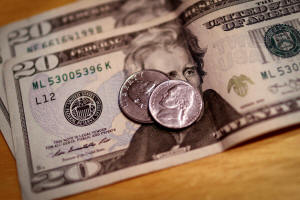The best money advice from dear old dad
 Send a link to a friend
Send a link to a friend
 [June 15, 2023] By
Chris Taylor [June 15, 2023] By
Chris Taylor
NEW YORK (Reuters) -No matter how successful you may be – even as a
founder, president, or CEO – none of us start out that way.
We absorb life lessons from the people around us, very often our
parents. In honor of Father’s Day, Reuters asked a few C-Suite leaders
about a key financial lesson they learned from dear old dad.
Here is what they had to say.
Reshma Saujani
Founder, Girls Who Code and Moms First
“My parents came to America as refugees, so although my dad was trained
as an engineer in Uganda, he first worked as a machinist in a factory.
Money was tight. A night out for dinner meant Taco Bell, and he never
went to the grocery store without coupons.
“Later on, when he worked as a civil engineer and became more
financially secure, he still never changed the way he spent. He never
went beyond his means, and never splurged. I took that advice to heart
as a nonprofit leader. That’s why Girl Who Code weathered the pandemic
when many others didn’t, because we had money in the bank for a rainy
day.
“I don’t clip coupons quite like my dad, but there has never been a sale
I didn’t like. I’m constantly lecturing my sons, that we used to get
only one toy under the Christmas tree. I want them to grow up with the
same values.”

Tori Dunlap
Author and founder, Her First $100K
“I was around eight years old, and when I came home from school one day,
my dad had purchased one of those vending machines – the kind where you
put a quarter in, and you get a handful of candy out. He asked me, ‘Do
you want to start a business?’
“I was precocious, so I said yes, That became a daddy-and-daughter thing
we would do together: Once a month we would go out and service the
machines. He taught me how to pitch myself, how to cold call people, how
to put a contract together. I had my own bank account and was signing
checks at 10 years old.

“I ended up having 15 of these vending machines by the time I graduated
from high school, and all the profits went into my college fund. Then I
sold those machines to another 10-year-old and her dad, who are doing
the same thing."
[to top of second column] |

U.S. currency is seen in this picture
illustration taken March 6, 2020. REUTERS/Mike
Segar/Illustration/File Photo

Mary Callahan Erdoes
CEO, J.P. Morgan Asset & Wealth Management
“I will never forget Saturdays with my dad, Pat Callahan, and my
three little brothers at the Jewel grocery store in Wilmette,
Illinois. My brothers would cram inside the cart, and I would push
them around, covering them in our favorite cereals, candy or actual
necessities. My father made this Saturday ritual an important math
and value lesson, too, though.
“He would ask, ‘Should we get the 100-sheet paper towels for $2 or
the 300-sheet one for $3?’ Or he would have us debate the merits of
brand names versus generic products – something that still tortures
me today when I have a choice.
“Each visit made us smarter, more curious, and of course, more
competitive. Today, when I roll down the aisles with my three girls,
I find myself asking them the same questions. They are, of course, a
bit taller now and don’t fit into a shopping cart anymore, but I’m
proud to say they have learned Papa’s lessons well.”
Rick Wurster
President, the Charles Schwab Corporation
“When I was growing up, my dad had a good career and worked hard to
support our family of six. His priority was always our family – he
never missed a game, concert, or any other opportunity to support
one of my three siblings or me. He was always focused on saving and
retirement, believing strongly in the adage, ‘A penny saved is a
penny earned’.
“Most importantly, he has always taught me that what is most
valuable in life is your family, not your money. They are what drive
you to do better and save smarter. Being raised with those values
makes you think about money through a different lens.
“While money is important, it’s the values you live by that really
shape outcomes of any kind. I think it’s why my dad has always
prioritized our family: Your money won’t miss you when you are
gone.”
(Reporting by Chris Taylor; Editing by Lauren Young and Lisa
ShumakerFollow us @ReutersMoney)
[© 2023 Thomson Reuters. All rights
reserved.]
This material may not be published,
broadcast, rewritten or redistributed.
Thompson Reuters is solely responsible for this content. |